- Home
- Robert Harris
The Ghost Page 25
The Ghost Read online
Page 25
In my pocket, I surreptitiously fingered my new mobile phone. Ought I to alert Rycart to what was happening? I decided not. I didn’t want to call him in front of witnesses. I would have felt too uncomfortable, my guilt too obvious. Treachery needs privacy. I surrendered myself to events.
We flew over the 59th Street Bridge like gods, Alice and Lucy giggling with excitement, and when we reached La Guardia a few minutes later we drove past the terminal building, through an open metal gate and directly on to the tarmac where a big private jet was being fuelled. It was a Hallington plane, in its dark blue livery, with the corporate logo painted on its high tail: the earth, with a circle girdling it, like the Colgate ring of confidence. Lang’s limousine swerved to a halt and he was the first to emerge. He dived through the doorway of the mobile body scanner and up the steps into the Gulfstream without a backward glance. A bodyguard hurried after him.
As I clambered out of the car I felt almost arthritic with anxiety. It took an effort simply to walk over to the steps where Amelia was standing. The night air was shaking with the noise of jets coming in to land. I could see them stacked five or six deep above the water, steps of light ascending into the darkness.
‘Now that’s the way to travel,’ I said, trying to sound relaxed. ‘Is it always like that?’
‘They want to show him they love him,’ said Amelia. ‘And no doubt it helps to show everyone else how they treat their friends. Pour encourager les autres.’
Security men with metal wands were inspecting all the luggage. I added my suitcase to the pile.
‘He says he has to get back to Ruth,’ she continued, gazing up at the plane. The windows were bigger than on a normal aircraft. Lang’s profile was plainly visible towards the rear. ‘There’s something he needs to talk over with her.’ Her voice was puzzled. She was almost talking to herself, as if I wasn’t there. I wondered if they’d had a row during the drive to the airport.
One of the security men told me to open my suitcase. I unzipped it and held it up to him. He lifted out the manuscript to search underneath it. Amelia was so preoccupied, she didn’t even notice.
‘It’s odd,’ she said, ‘because Washington went so well.’ She stared vacantly towards the lights of the runway.
‘Your shoulder bag,’ said the security man.
I handed it to him. He took out the package of photographs, and for a moment I thought he was going to open it up, but he was more interested in my laptop. I felt the need to keep talking.
‘Perhaps he’s heard something from The Hague,’ I suggested.
‘No. It’s nothing to do with that. He would have told me.’
‘Okay, you’re clear to board,’ said the guard.
‘Don’t go near him just yet,’ she warned, as I moved to pass through the scanner. ‘Not in his present mood. I’ll take you back to him if he wants to talk.’
I climbed the steps.
Lang was sitting in the very end seat, nearest to the tail, his chin in his hand, gazing out of the window. (The security people always liked him to sit in the last row, I discovered later: it meant no one could get behind him.) The cabin was configured to take ten passengers, two each on a couple of sofas that ran along the side of the fuselage, and the rest in six big armchairs. The armchairs faced one another in pairs, with a stowaway table between them. It looked like an extension of the Waldorf’s lobby: gold fittings, polished walnut and padded, creamy leather. Lang was in one of the armchairs. The Special Branch man sat on a nearby sofa. A steward in a white jacket was bending over the former prime minister. I couldn’t see what drink he was being served, but I could hear it. Your favourite sound might be a pair of nightingales in a summer dusk, or a peal of village church bells. Mine is the clink of ice against cut glass. Of this I am a connoisseur. And it sounded distinctly to me as if Lang had given up tea in favour of a stiff whisky.
The steward saw me staring and came down the gangway towards me.
‘Can I get you something, sir?’
‘Thanks. Yes. I’ll have whatever Mr Lang is having.’
I was wrong: it was brandy.
By the time the door was closed, there were twelve of us on board: three crew (the pilot, co-pilot and steward), and nine passengers – two secretaries, four bodyguards, Amelia, Adam Lang and me. I sat with my back to the cockpit so that I could keep an eye on my client. Amelia was directly opposite him, and as the engines started to whine it was all I could do not to hurl myself at the door and wrench it open. That flight felt doomed to me from the start. The Gulfstream shuddered slightly, and slowly the terminal building seemed to drift away. I could see Amelia’s hand making emphatic gestures, as if she were explaining something, but Lang just continued to stare out at the airfield.
Someone touched my arm. ‘Do you know how much one of these things costs?’
It was the policeman who’d been in my car on the drive from the Waldorf. He was in the seat across the gangway.
‘I don’t, no.’
‘Have a guess.’
‘I genuinely have no idea.’
‘Go on. Try.’
I shrugged.
‘Ten million dollars?’
‘Forty million dollars.’ He was triumphant, as if knowing the price somehow implied he was involved in the ownership. ‘Hallington have five.’
‘Makes you wonder what they can possibly use them all for.’
‘They lease them out when they don’t need them.’
‘Oh yes, that’s right,’ I said. ‘I’d heard that.’
The noise of the engines increased and we began our charge down the runway. I imagined the terrorist suspects, handcuffed and hooded, strapped into their luxurious leather armchairs as they lifted off from some red-dusted military airstrip near the Afghan border, bound for the pine forests of eastern Poland. The plane seemed to spring into the air and I watched over the edge of my glass as the lights of Manhattan spread to fill the window, then slid and tilted, and finally flickered into darkness as we rose into the low cloud. It felt as though we were climbing blindly for a long time in our vulnerable metal tube, but then the gauze fell away and we came up into a bright night. The clouds were as massive and solid as alps, and the moon appeared occasionally from behind the peaks, lighting valleys and glaciers and ravines.
Some time after the plane levelled off, Amelia rose and came down the aisle towards me. Her hips swayed, involuntarily seductive, with the motion of the cabin.
‘All right,’ she said, ‘he’s ready to have a word. But go easy on him, okay? He’s had a hell of a couple of days.’
He and I both, I thought.
‘Will do,’ I said.
I fished out my shoulder bag from beside my seat and began to squeeze past her. She caught my arm.
‘You haven’t got long,’ she warned. ‘This flight’s only a hop. We’ll be starting to descend any minute.’
*
It certainly was a hop. I checked afterwards. Only two hundred and sixty miles separate New York City from Martha’s Vineyard, and the cruising speed of a Gulfstream G450 is five hundred and forty-eight miles per hour. The conjunction of these two facts explains why the tape of my conversation with Lang lasts a mere eleven minutes. We were probably already losing altitude even as I approached him.
His eyes were closed, his glass still held in his outstretched hand. He had removed his jacket and tie, and eased off his shoes, and was sprawled back in his seat like a starfish, as if someone had pushed him into it. At first I thought he’d fallen asleep, but then I realised his eyes were narrowed to slits and he was watching me closely. He gestured vaguely with his drink towards the seat opposite him.
‘Hi, man,’ he said. ‘Join me.’ He opened his eyes fully, yawned, and put the back of his hand to his mouth. ‘Sorry.’
‘Hello, Adam.’
I sat down. I had my bag in my lap. I fumbled to pull out my notebook, the mini-recorder and a spare disc. Wasn’t this what Rycart wanted? Tapes? Nervousness made me clumsy, and if Lang had s
o much as raised an eyebrow, I would have put the recorder away again. But he didn’t appear to notice. He must have gone through this ritual so many times at the end of some official visit – the journalist conducted into his presence for a few minutes’ exclusive access; the tape machine nervously examined to make sure it works; the illusion of informality over the relaxing prime ministerial drink. In the recording you can hear the exhaustion in his voice.
‘So,’ he said, ‘how’s it going?’
‘It’s going,’ I said. ‘It’s certainly going.’
When I listen to the disc, my register’s so high from the anxiety, it sounds as I’ve been sucking helium.
‘Found out anything interesting?’
There was a gleam of something in his eyes. Contempt? Amusement? I sensed he was playing with me.
‘This and that. How was Washington?’
‘Washington was great, actually.’ There’s a rustling noise as he straightens slightly in his chair, drawing himself up to give one last performance before the theatre closes for the night. ‘I got the most terrific support everywhere – on the Hill, of course, as you probably saw, but also the Vice President and the Secretary of State. They’re going to help me in every way they can.’
‘And is the bottom line that you’ll be able to settle in America?’
‘Oh, yes. If the worst comes to the worst, they’ll offer me asylum, certainly. Maybe even a job of some kind, as long as it doesn’t involve overseas travel. But it won’t get that far. They’re going to supply something much more valuable.’
‘Really?’
Lang nodded. ‘Evidence.’
‘Right.’ I hadn’t a clue what he was talking about.
‘Is that thing working?’ he asked.
There is a deafening clunk as I pick up the disc recorder.
‘Yes, I think so. Is that okay?’
With a thump, I replace it.
‘Sure,’ said Lang. ‘I just want to make sure you get this down, because I definitely think we can use it. This is important. We should keep it as an exclusive for the memoirs. It will do wonders for the serialisation deal.’ He leaned forwards to emphasise his words. ‘Washington is prepared to provide sworn testimony that no United Kingdom personnel were directly involved in the capture of those four men in Pakistan.’
‘Really?’ Really? Really? I keep on parroting it, and I wince every time I hear the sycophancy in my voice. The fawning courtier. The self-effacing ghost.
‘You bet. The director of the CIA himself will provide a deposition to the court in The Hague, saying that this was an entirely American covert operation, and if that doesn’t do the trick he’s prepared to let the actual officers who were running the mission provide evidence in camera.’ Lang sat back and sipped his brandy. ‘That should give Rycart something to think about. How’s he going to make a charge of war crimes stick now?’
‘But your memorandum to the Ministry of Defence—’
‘That’s genuine,’ he conceded with a shrug. ‘It’s true, I can’t deny that I urged the use of the SAS. And it’s true the British government can’t deny that our special forces were in Peshawar at the time of Operation Tempest. And we also can’t deny that it was our intelligence services that tracked down these men to the particular location where they were arrested. But there’s no proof that we passed that intelligence on to the CIA.’
Lang smiled at me.
‘But we did?’
‘There’s no proof that we passed that intelligence on to the CIA.’
‘But if we did, surely that would be aiding and abetting—’
‘There’s no proof that we passed that intelligence on to the CIA.’
He was still holding his smile, albeit now with just a crease of concentration in his brow, as a tenor might hold a note at the end of a difficult aria.
‘Then how did it get to them?’
‘That’s a difficult question. Not through any official channel, that’s for sure. And certainly it was nothing to do with me.’ There was a long pause. His smile died. ‘Well,’ he said. ‘What do you think?’
‘It sounds a bit’ – I tried to find some diplomatic way of saying it – ‘technical.’
‘Meaning?’
My reply on the tape is so slippery, so sweaty with nervous circumlocutions, it’s enough to make one laugh out loud.
‘Well – you know – you admit yourself you wanted the SAS to pick them up – no doubt for, you know, understandable reasons – and even if they didn’t actually do the job themselves, the Ministry of Defence – as I understand it – hasn’t really been able to deny they were involved, presumably because they were, in a way, even if – even if – they were only parked in a car around the corner. And apparently British – you know – intelligence gave the CIA the location where they could be picked up. And when they were tortured, you didn’t condemn it.’
The last line was delivered in a rush. Lang said coldly, ‘Sid Kroll was very pleased with the commitment he was given by the CIA. He believes the prosecutor may even have to drop the case.’
‘Well, if Sid says that—’
‘But fuck it,’ said Lang suddenly. He banged his hand on the edge of the table. On the tape it sounds like an explosion. The dozing Special Branch man on the nearby sofa looked up sharply. ‘I don’t regret what happened to those four men. If we’d relied on the Pakistanis we’d never have got them. We had to grab them while we had the chance, and if we’d missed them, they’d have gone underground and the next time we’d have known anything about them would’ve been when they were killing our people.’
‘You really don’t regret it?’
‘No.’
‘Not even the one who died under interrogation?’
‘Oh, him,’ said Lang dismissively. ‘He had a heart problem – an undiagnosed heart problem. He could have died any time. He could have died getting out of bed one morning.’
I said nothing. I pretended to make a note.
‘Look,’ said Lang, ‘I don’t condone torture, but let me just say this to you. First, it does actually produce results – I’ve seen the intelligence. Second, having power, in the end, is all about balancing evils, and when you think about it, what are a couple of minutes of suffering for a few individuals compared to the deaths – the deaths, mark you – of thousands. Third, don’t try telling me this is something unique to the War on Terror. Torture’s always been part of warfare. The only difference is that in the past there were no fucking media around to report it.’
‘The men arrested in Pakistan claim they were innocent,’ I pointed out.
‘Of course they claim they were innocent! What else are they going to say?’ Lang studied me closely, as if seeing me properly for the first time. ‘I’m beginning to think you’re too naïve for this job.’
I couldn’t resist it.
‘Unlike Mike McAra?’ I said.
‘Mike!’ Lang laughed and shook his head. ‘Mike was naïve in a different way.’
The plane was beginning to descend quite rapidly now. The moon and stars had gone. We were dropping through cloud. I could feel the pressure change in my ears, and I had to pinch my nose and swallow hard.
Amelia made her way down the aisle.
‘Is everything all right?’ she asked. She looked concerned. She must have heard Lang’s outburst of temper; everyone must have.
‘We’re just doing some work on my memoirs,’ said Lang. ‘I’m telling him what happened over Operation Tempest.’
‘You’re taping it?’ said Amelia.
‘If that’s all right,’ I said.
‘You need to be careful,’ she told Lang. ‘Remember what Sid Kroll said.’
‘The tapes will be yours,’ I interrupted, ‘not mine.’
‘They could still be subpoenaed.’
‘Stop treating me as though I’m a child,’ said Lang abruptly. ‘I know what I want to say. Let’s deal with it once and for all.’
Amelia permitted herself a slight widening o
f her eyes, and withdrew.
‘Women!’ muttered Lang. He took another gulp of brandy. The ice had melted but the colour of the liquid remained dark. It must have been a very full measure, and it occurred to me that our former prime minister was slightly drunk. I sensed this was my moment.
‘In what way,’ I asked, ‘was Mike McAra naïve?’
‘Never mind,’ muttered Lang. He nursed his drink, his chin on his chest, brooding. He suddenly jerked up again. ‘I mean, take for instance all this civil liberties crap. You know what I’d do if I were in power again? I’d say, okay then, we’ll have two queues at the airports. On the left, we’ll have queues to flights on which we’ve done no background checks on the passengers, no profiling, no biometric data, nothing that infringed anyone’s precious civil liberties, used no intelligence obtained under torture – nothing. On the right, we’ll have queues to the flights where we’ve done everything possible to make them safe for passengers. Then people can make their own minds up which plane they want to catch. Wouldn’t that be great? To sit back and watch which queue the Rycarts of this world would really choose to put their kids on, if the chips were down.’
‘And Mike was like that?’
‘Not at the beginning. But Mike, unfortunately, discovered idealism in his old age. I said to him – it was our last conversation, actually – I said, if our Lord Jesus Christ was unable to solve all the problems of the world when He came down to live among us – and He was the son of God! – wasn’t it a bit unreasonable of Mike to expect me to have sorted everything out in ten years?’
‘Is it true you had a serious row with him? Just before he died?’
‘Mike made certain wild accusations. I could hardly ignore them.’
‘May I ask what kind of accusations?’
I could imagine Rycart and the special prosecutor sitting listening to the tape, straightening in their chairs at that. I had to swallow again. My voice sounded muffled in my ears, as if I was talking in a dream, or hailing myself from a great distance. On the tape, the pause that follows is quite short, but at the time it seemed endless, and Lang’s voice when it came was deadly quiet.

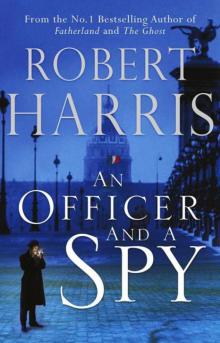 An Officer and a Spy
An Officer and a Spy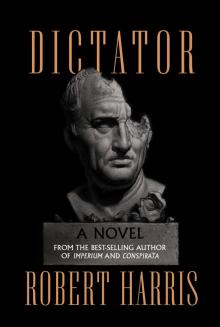 Dictator
Dictator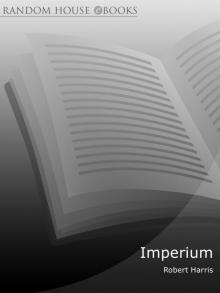 Imperium:
Imperium: Enigma
Enigma Fatherland
Fatherland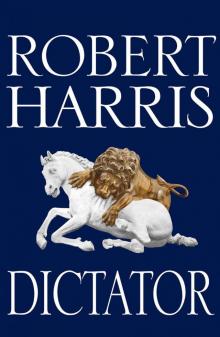 Dictator:
Dictator: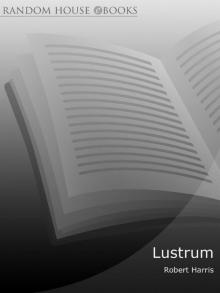 Lustrum
Lustrum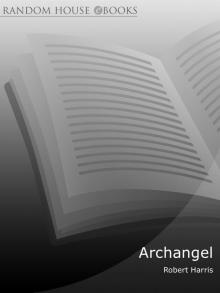 Archangel
Archangel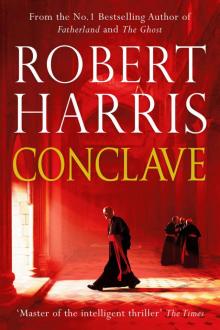 Conclave
Conclave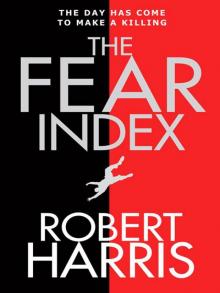 The Fear Index
The Fear Index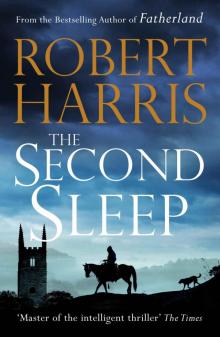 The Second Sleep
The Second Sleep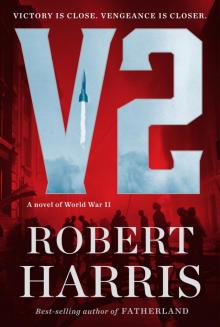 V2
V2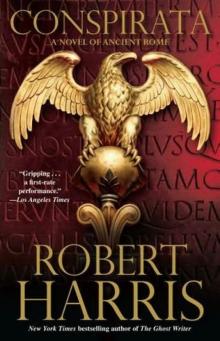 Lustrum c-2
Lustrum c-2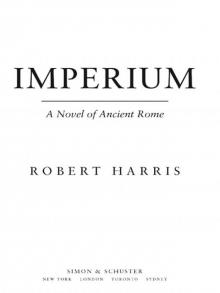 Imperium
Imperium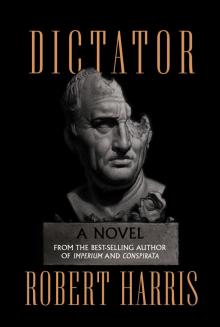 The Dictator
The Dictator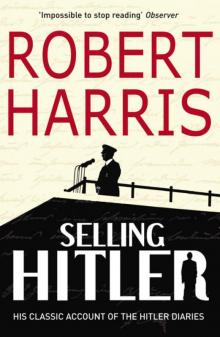 Selling Hitler
Selling Hitler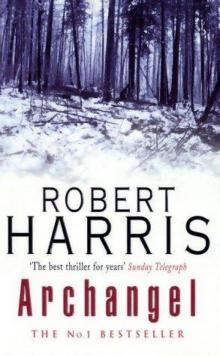 Archangel (Mass Market Paperback)
Archangel (Mass Market Paperback)